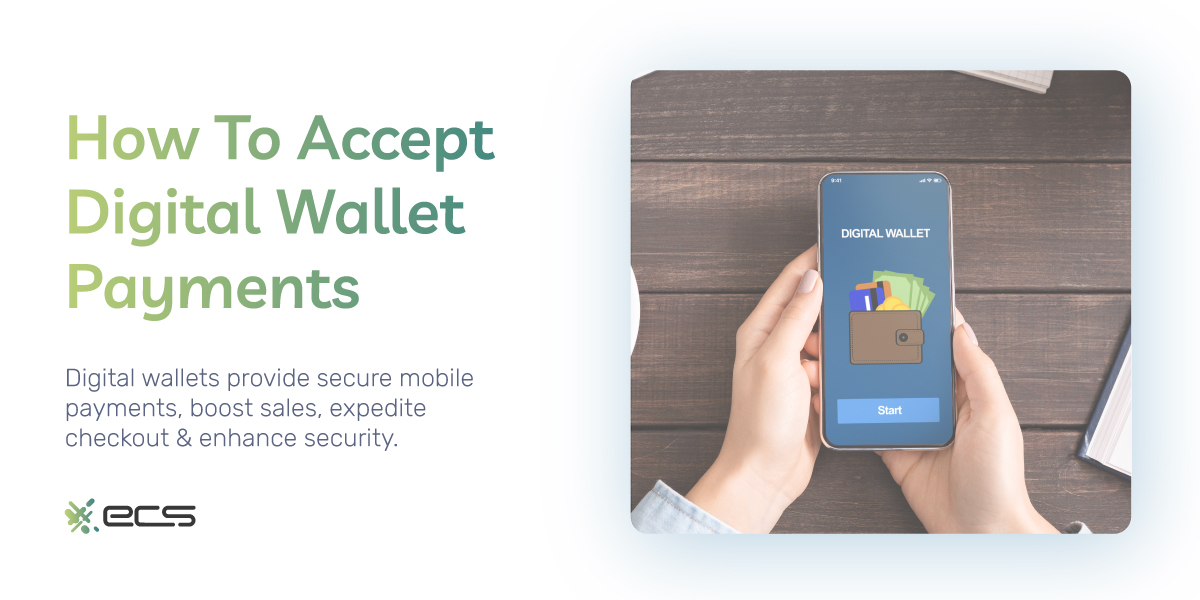Digital payments are essential to any modern business. Brick-and-mortar or e-commerce businesses all need the latest payment technologies to meet the changing habits of today’s tech-savvy consumers. One area that has seen explosive growth is the use of digital wallets. Digital wallets allow consumers to make contactless payments without needing their physical credit or debit card.
For businesses, digital wallets offer an opportunity to satisfy customer demand and speed up the overall checkout or payment processing workflow. To help your business adopt and take advantage of digital wallet payment technology, we’ll explain how they work and what you need to start accepting them.
By the end of this article, you’ll be fully versed in digital wallets and ready to offer this new technology to your customers.
What Is A Digital Wallet?
A digital wallet is a software app stored on a smartphone or other compatible device. Digital wallets are linked to the preferred credit or debit cards customers use for purchases. They can also be linked to gift cards, bank accounts, and even a government ID.
When customers enter your business and are checking out or making a payment, they present their smartphone to your digital wallet-enabled payment terminal.
These terminals use near-field communication (NFC) to read and accept payment information from the digital wallet. There is no contact needed between the terminal and the customer’s device.
When the customer’s device and your payment terminal communicate, a “token” is sent. This token is an encrypted one-time mathematical code that represents the customer’s credit card number.
The actual credit card number is not sent. The payment network automatically decodes this token to complete the transaction, just like any other credit or debit card purchase.
This process is known as “tokenization,” it is highly secure since the actual credit card information is never transmitted. This makes intercepting the transmission essentially useless for cybercriminals.
Customers can also use digital wallets for payments online when purchasing products and services on websites.
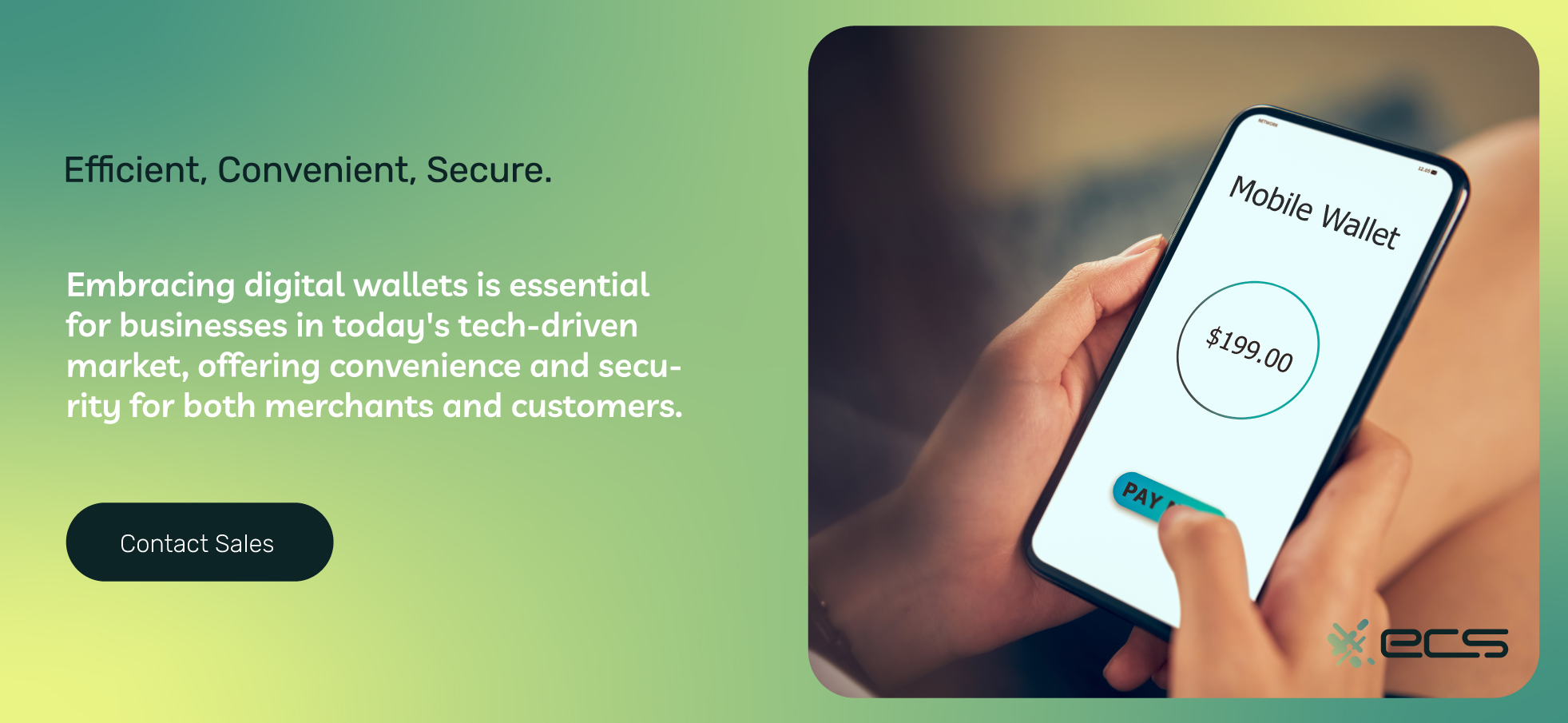
Types Of Digital Wallets
Several main digital wallets are used in the United States, and many more are used worldwide.
The most common digital wallets in America are:
Apple Pay
Apple Pay dominates as the most popular digital wallet in the U.S. and sees usage across countries worldwide. Apply Pay is free for customers but only works on Apple devices.
Customers can configure Apple Pay to include additional security features such as fingerprint ID, facial ID, or a simple passcode.
Google Pay
Google Pay’s digital wallet works on virtually any smartphone or device, regardless of the operation system. This means Google Pay can work on Apple phones and any Android device.
Google Pay works similarly to Apple Pay, and users can add additional security measures like password retrieval for backup or 2-factor authorization.
Samsung Pay
Samsung’s wallet is not as popular as Apple or Google’s Wallet, but it still boasts millions of users. Samsung designed Samsung Pay for newer Samsung smartphones, but technically, any Android device with NFC capabilities and an upgraded operating system can run it.
What Hardware Do I Need To Accept Digital Wallet Payments?
While digital wallets involve advanced technology, merchants can easily accept these payments.
Since digital wallets work via NFC, you need an NFC-compatible payment terminal or card reader.
Most newer credit card readers will already have this function. Merchants normally use NFC technology to process “tap to pay” payments with chip cards.
If you’re using mobile card readers or performing mobile processing, your readers must also be NFC-capable. In most cases, they will be, and you should have the necessary hardware.
Merchant Account & Gateway
Once you have the necessary payment terminals to accept digital wallets, you want to ensure your merchant account and payment gateway allow you to process them.
You might have to enable these payments within your payment gateway merchant dashboard or Point of Sale (POS) software.
When you enable these payments, you might need to enter certain credentials depending on your method of accepting the payments.
You can choose to accept payments directly, which is a type of peer-to-peer setup. This is less common for businesses.
Most businesses will accept these payments along with all their other credit card payments and merchant services.
Suppose your merchant account and payment gateway accept digital wallet payments. In that case, you process them just like your other electronic payments, and you won’t notice any difference when a customer uses a digital wallet or a physical card.
Benefits of Digital Wallet Payments for Businesses
Some business owners may see accepting digital wallets as just another expense or complication for their business. However, this couldn’t be further from the truth.
Businesses can benefit significantly from accepting digital wallet payments and other accepted payment methods.
Increased Sales
Several studies have shown that consumers spend more money when they use digital wallets.
Regardless of the technology, if you can make it easier for your customers to spend money, you will see an increase in sales.
Not only that, digital wallets can also lead to higher average transaction amounts. Digital wallets empower consumers to go beyond the cash or cards they carry in their physical wallets.
This means they can make more impulse or unplanned purchases.
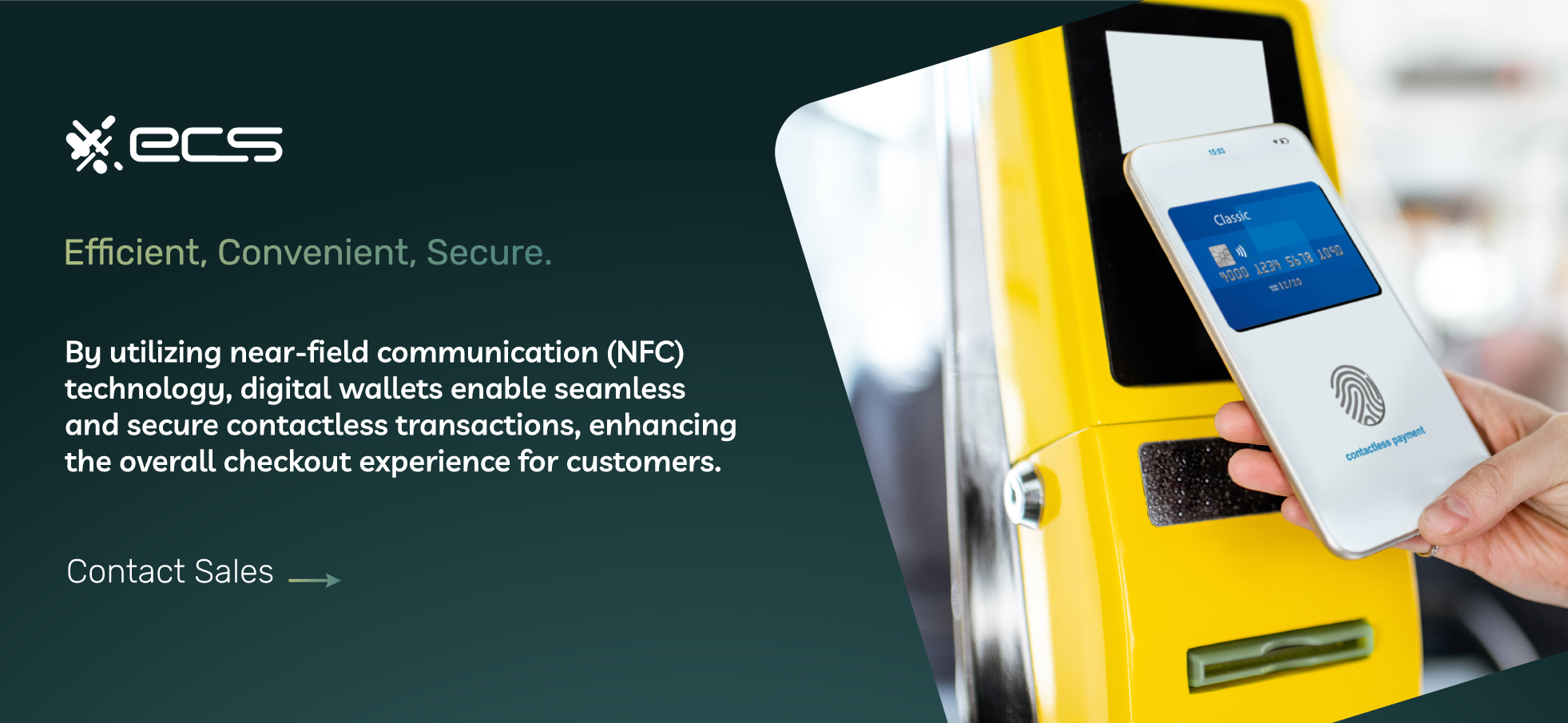
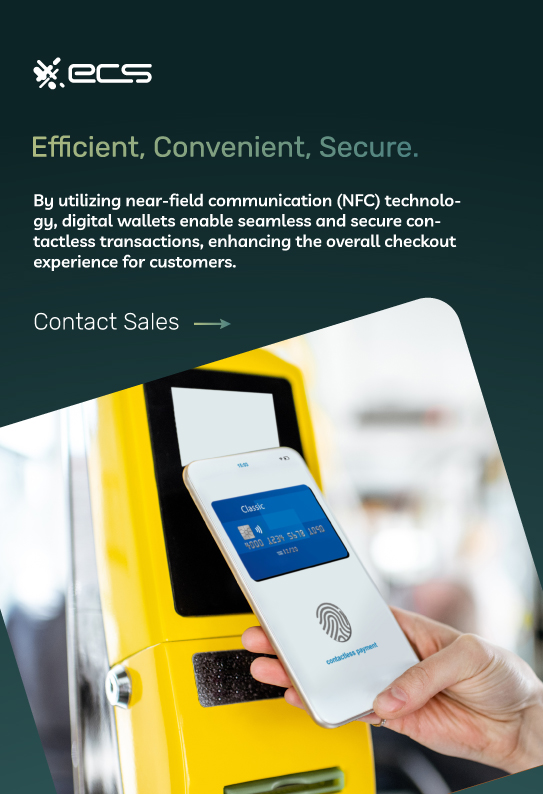
Faster Checkout
Most customers can grab their phone faster than they can reach for a credit card or cash. It’s not unusual for customers to already have their phones in their hands when checking out.
This means a faster checkout or cash wrap area for your business, which improves the overall customer experience you can deliver.
Digital wallet payments are also perfect if you offer mobile ordering or pick-up at your store or restaurant. Customers can quickly pick up their items and tap their phone to pay in just a few seconds.
This creates higher turnover capabilities and less work for your employees, allowing you to reduce labor costs.
Trust & Security
Consumers already trust brands like Google or Apple with their payment details. So when a small business accepts these digital wallets, consumers will have more trust in them.
As a merchant, these payment methods are also highly secure. Tokenization ensures the system never transmits or exposes the customer’s payment details. This means less risk of fraud for you.
When using contactless digital wallets, you can rest assured that you won’t have to worry about skimmers or other technology stealing sensitive credit card data.
Attract New Customers
Consumers are specifically shopping at businesses that accept digital wallet payments. Many customers say they would stop shopping at a business if they didn’t accept digital payments.
For businesses that don’t accept these payments, that means lost revenue.
As digital wallet adoption accelerates, the number of consumers who demand digital wallet payment options will only increase.
As a merchant, you don’t want to lose customers over something as simple as accepting digital wallet payments.
Future-Proof Your Business
If you’re not currently able to accept digital wallet payments, it’s likely a sign that other parts of your payment processing workflow are out of date.
Today, payment hardware and software are integral to many core business operations, such as inventory, sales forecasting, and human resource management.
Outdated payment processing workflows make it more difficult for businesses to scale and grow. Upgrading your equipment and being able to accept digital wallet payments will likely improve your overall payment infrastructure.
The hardware needed to accept digital wallet payments is relatively inexpensive. Integrating with almost any existing payment processing workflow is also very easy.
Making this small investment will help your business in the future, but it will also help you increase efficiency and boost sales today.
Costs of Accepting Digital Wallet Payments
One of the reasons these payment methods were adopted so quickly is that there are no costs associated with digital wallet payments for customers.
For merchants, digital wallet payments don’t incur additional processing or transaction fees on top of what you are already paying. The network processes these transactions similarly to how it processes physical card transactions, like tap-to-pay payments.
You will also receive your funds in the same time as your standard credit or debit card purchases.
Hardware Costs
The only cost for businesses to accept digital wallets is the initial purchase of any required hardware devices or software upgrades.
You may not have to purchase any new equipment if you already have NFC-capable payment terminals. They are relatively affordable and well worth the investment, considering the number of transactions you will accept with them over time.
Finally, if you buy new payment terminals, you may want to consider the rest of your payment processing equipment. If you’ve considered a new POS system or other improvements, now would be a great time to complete the upgrade.
Doing this all at once will ensure everything you implement will work seamlessly together to provide you the most benefit.
Future Of Digital Wallets
By all accounts, digital wallets are a long-term trend and not some technology fad that will fade away.
Already, several states have approved digital wallets for carrying government identification. Other states currently have pending legislation or working groups in progress to adopt digital wallets for identification as well.
This signals that the future of digital wallets will likely go beyond just payments and become an everyday facet of modern life when conducting virtually any business.
Another thing to consider is the advent of wearable smart devices, like smartwatches. These are also growing in popularity, and customers can link digital wallets to these devices.
This move could make it so customers don’t need their smartphones and can simply tap their wearable devices to make payments.
Finally, there are the so-called “super apps,” which dominate Asia and other parts of the world. These super apps combine digital wallets, communication, and social media functions on the same platform.
A popular super app is WeChat. The WeChat app combines messaging along with digital wallet technology. But people can also use these apps to shop online, purchase airline tickets, or buy just about anything else.
Consumers enjoy the convenience of these super apps, and businesses can take advantage of how easy it is for consumers to make purchases across any channel, from mobile to in-store.
It likely won’t be long until these super apps start to take hold in America and other places around the world. Several tech giants and some startups are currently working on the technology and regulations to introduce super apps to U.S. consumers.
Overall, digital wallets will be an integral part of any business that wants to stay competitive and offer customers the most flexible payment options possible.
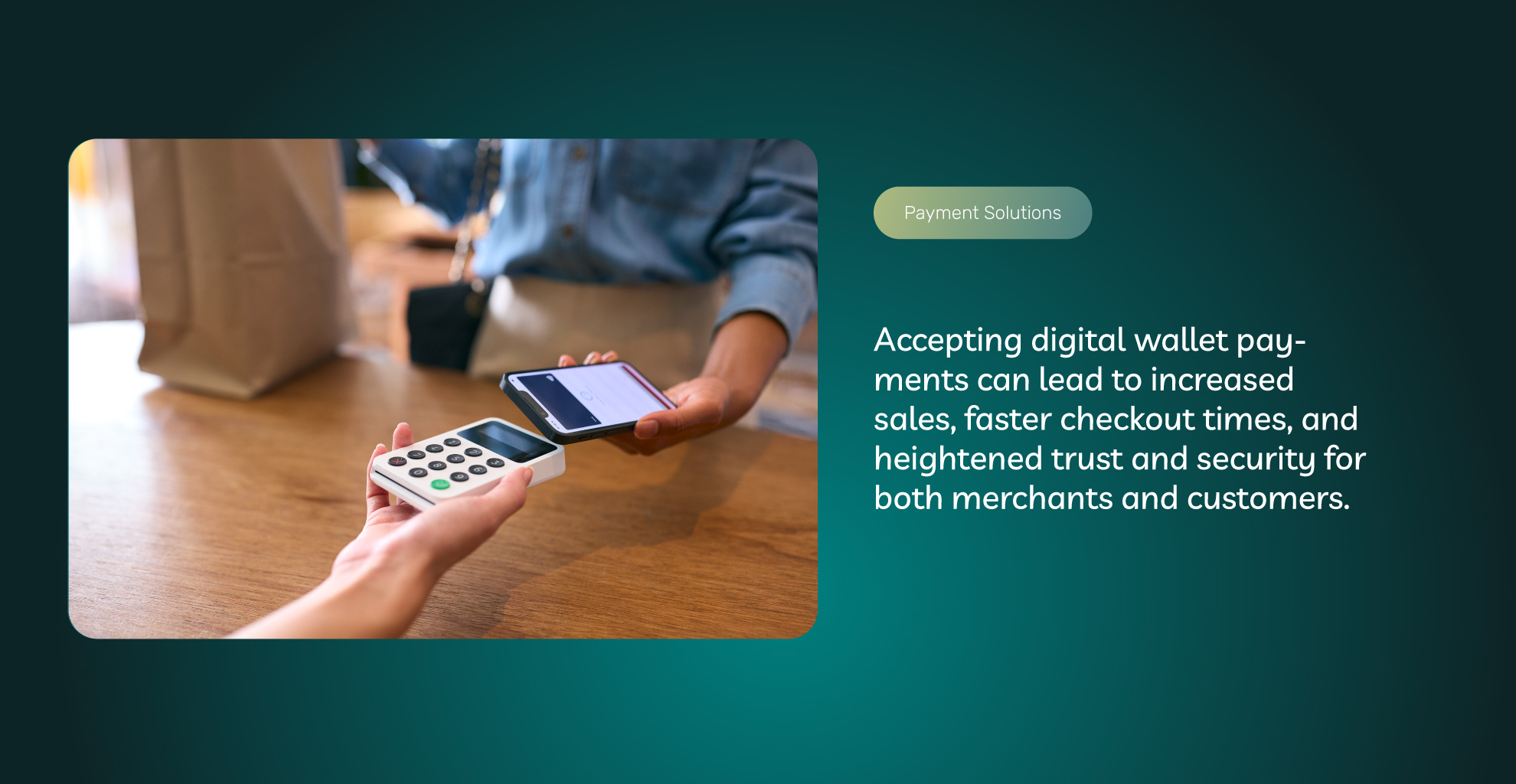
Help Accepting Digital Wallets
In today’s business environment, accepting digital wallet payments has become a necessity. The benefits far outweigh the minimal initial investment. This creates a significant ROI opportunity for any business or retailer.
If your business needs to upgrade its payment system to accept digital wallet payments, contact ECS Payments.
At ECS Payments, we specialize in offering the latest payment solutions, including digital wallet payments.
Our in-house technical experts can help you choose the hardware and software you need to bring your payment processing to the next level.
Contact ECS Payments to learn more about our digital wallet payment processing solutions.
Frequently Asked Questions for Accepting Digital Wallet Payments
A digital wallet is a smartphone/smart device app that secures digital versions of credit and debit cards. It is used for contactless mobile payments without needing physical cards. Customers use it by hovering their phones over an NFC-enabled payment terminal. Common digital wallets include Apple Pay, Google Pay, and Samsung Pay. Contact ECS Payments to learn more about implementing digital wallet solutions into your business.
Businesses need a merchant account and a payment gateway that supports digital wallets, plus an NFC-compatible payment terminal. Most modern payment terminals come equipped with contactless NFC capabilities. Contact ECS Payments to learn more about implementing digital wallet solutions into your business.
Accepting digital wallets attracts a certain demographic of new customers, which leads to increased sales. They also accelerate checkout times and enhance security. Contact ECS Payments to learn more about implementing digital wallet solutions into your business.
Costs include purchasing an NFC-compatible terminal. Also, keep in mind that digital wallet payments are contactless and contactless transactions cost less than card not present payments. Contact ECS Payments to learn more about implementing digital wallet solutions into your business.
